While the number of algorithm changes so far in 2016 has been lower than average, several no-name updates have stormed through Google's search results, disrupting top-page standard bearers.
In May, Google started issuing outbound link penalties and devaluing media sites. This caused a big shakeup as the ripple affect dethroned many highly-ranked page one listings and introduced some new websites to the top.
On Friday, September 2nd, Search Engine Roundtable reported that search engine marketers and tracking services were seeing a lot of movement in Google's results.
Mozcast which tracks worldwide ranking data and rates the movement with a temperature, rated Thursday as 108 degrees and 90 degrees on Friday September 2nd.
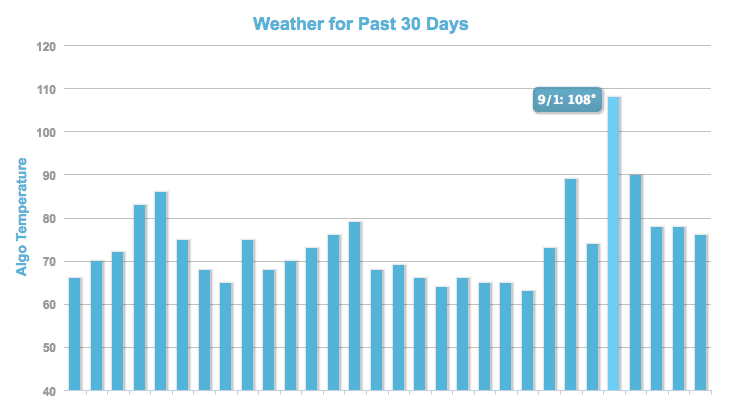
The SERP Metrics Flux Report also reported a large amount of movement on Friday.
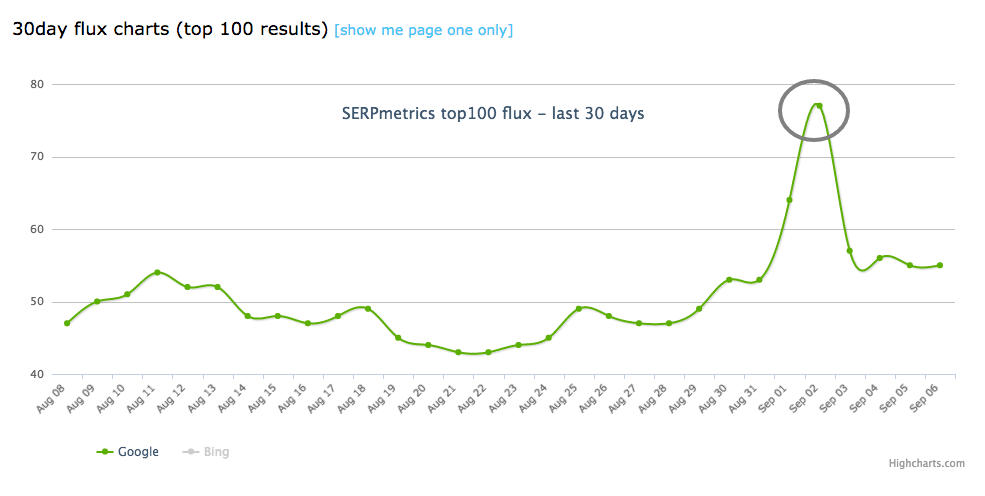
By the end of Friday, Google still had not released a statement.
An Update Happened, but it Wasn't Penguin 4.0
On Tuesday, September 6th, during a Google Hangout, Google's John Mueller said,
“It wasn’t Penguin, but we do roll out a lot of updates over time, sometimes multiple updates… This isn’t the kind of update that we would announce. It wasn’t Penguin, so you can, I guess, cross that off your list. There are lots of different updates that we do, we make thousands of updates every year, and most of them we don’t give specific names. We don’t call out and announce each one.”
Google's updates in 2016 have come with minimal public information and packed significant punches, which have been greater than those caused by some of the big, named algorithm changes of past years.
Local and Below Map Results Have Changed
Let's talk legal. While reporting tools are looking at millions of keywords across the globe, we follow hundreds of thousands of rankings for attorneys in the United States. Based on data updated on September 6th, we are confirming a lot of movement on the map and some (but less) movement in the below-map results. Mid to high competitive terms are affected the most.
Change Stats
Based on Tuesday's ranking report, we are showing the following data for law firm's websites that appear to be affected by the update:
Visibility decreases averaging 1.5% for websites that had more below-map rankings than local rankings.
Visibility increases across our network averaging upwards of 5% for sites positively affected by the change.
Close ranking competitors have either risen or fallen together.
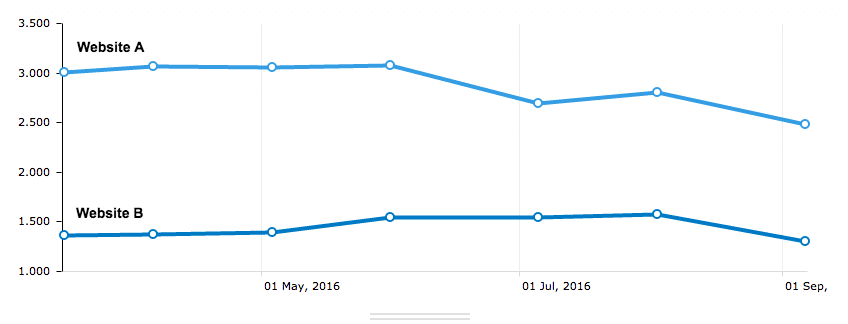
Some exact match domains have moved up. In the example below, the two domains circled have the keyphrase “employment lawyer” in their domain names.
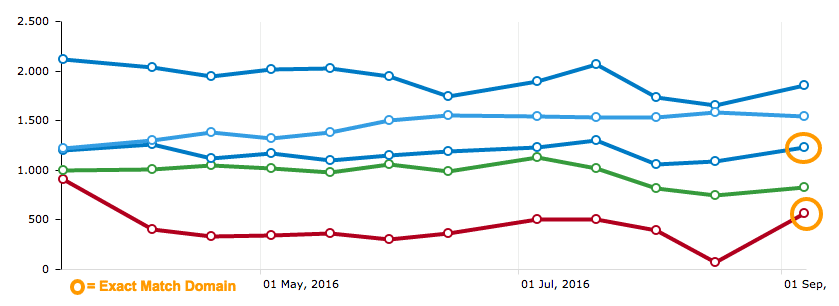
Keywords in Business Names
The most disturbing trend we're seeing in the aftermath of this update is an increase in local rankings for websites that include keyphrases in their titles or throughout the listing. Keywords are only allowed in the title if its part of the legal business name (as some examples below will show). The concern is that if Google gives weight to keyword-rich business names then traditionally named law firms are at a disadvantage.
This site has never ranked on the map for one of our tracked terms that includes the city “Virginia Beach” but now ranks number two:

In San Francisco, a search for “SF Employment Lawyers” now shows three websites that have never before appeared in our reports. All three of them include the keyphrase in the name of the firm.
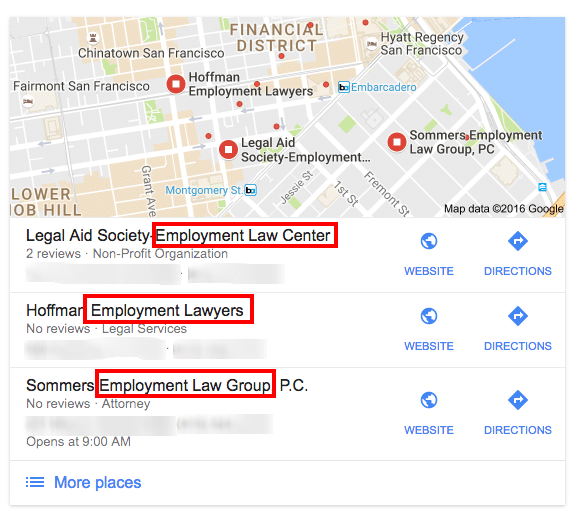
Across the country in every practice area, we are seeing a lot of keywords in law firm names that now appear on the map. This is just a small sample of what we found.


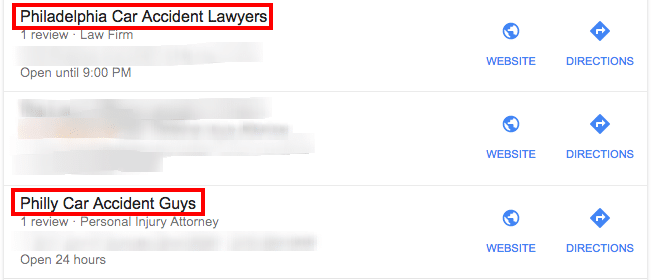






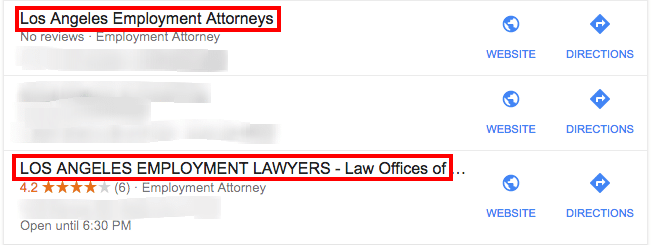




While some of the firms in these examples have a keyword in their legal business names, it's obvious some of the titles are solely for SEO. All of the examples currently have top three map listings, and most were not there prior to the update.
If you're surprised to see your firm above, you're not alone. One of the firm's we contacted had no idea what their local listing looked like and another said they deleted the listing with the keyword-stuffed-title and have been sending clients to a newer one that only uses their law firm's name for over a year. Some examples don't even have websites.
Guidelines for Representing Your Business on Google
We reviewed Google's Guidelines for Representing Your Business and there doesn't appear to be a loosening of business naming rules. In fact, Google addresses the very practice of stuffing keywords in a business name with the excerpts below from Google's Guidelines:
Business Information: Name
Your name must not include:
Marketing taglines.
Not acceptable: "TD Bank, America’s Most Convenient Bank", "GNC Live Well*".
Acceptable: "TD Bank", "GNC"
Fully capitalized words* (with the exception of acronyms) or unnecessary spaces.
Not acceptable: "SUBWAY"
Acceptable: "Subway", "KFC", "IHOP", "JCPenney"
*An example of improper capitalization can be see with the Los Angeles Employment Lawyer example above.
Service or product information about your business, unless this information is part of its real world representation or this information is needed to identify a department within a business (see "Departments").
Not acceptable:* "Verizon Wireless 4G LTE", "Safeway Supermarket Food & Drug", "Midas Auto Service Experts"
Acceptable: "Verizon Wireless", "Safeway", "Midas", "Best Buy Mobile", "Advance Auto Parts", "JCPenney Portrait Studios"
*When a law firm presents their name like "Smith Law Firm Personal Injury Lawyers", they are violated this rule.
Location information, such as neighborhood, city, or street name, unless it is part of the real-world representation of the business. Your name must not include street address or direction information.
Not acceptable: "Starbucks Downtown", "Macy’s Union Square", "Holiday Inn (I-93 at Exit 2)", "U.S. Bank ATM - 7th & Pike - Parking Garage Lobby near Elevator"
Acceptable:* "Starbucks", "Macy’s", "Holiday Inn Salem", "U.S. Bank ATM"
*The Holiday Inn Salem would be allowed only because that's how they're advertised offline. If a billboard outside of a law office said "The New York Personal Injury, Auto Accident, and Work Injury Law Firm of Smith & Associates" and all commercials, print ads, and letterheads said the same, then the firm would be within the guidelines. Otherwise, it is obvious keyword stuffing.
Never Panic
If your website took a hit, don't panic. The full effects of Google's updates are not always immediate. If Google is rolling out an update, there is a chance it is still making its way through a nearly infinite network of servers. However, your law firm marketing company should be doing some things during the shakeup.
1) Get to know your new competitors. Whether or not they may be cheating, if a new law firm is ranking ahead of you or near you, research it and learn as much as possible. In the event that this website sticks around on the first page, you want to know everything you can about their strategy.
2) Review your content. Not all changes address bad links; many Google algorithm updates are content related. Considering the influence of business names in the local results, we are speculating that this update is more about content than links.
3) Don't lower the bar. If you are seeing keyword-heavy listings hitting your competitor list, don't add keywords to your own local listing to ride the rule-breaking-wave. Unless it's your legal name, it is against Google's terms, and any short-term rewards you might see will most likely be erased with a future update.
Watch. Wait. Learn. Act.
After the rankings settle, work with your search marketing firm to establish a plan that keeps you moving forward and upward. By researching the new high ranking competitors, you can get clues as to what Google suddenly likes about their website and use that information to your advantage.
Google's algorithm will change daily and these updates are nothing to stress out about even if you're seeing a temporary dip. Embrace these changes as each shift can potentially yield new opportunities. Perhaps John F. Kennedy said it best:
Change is the law of life. And those who look only to the past or present are certain to miss the future.

